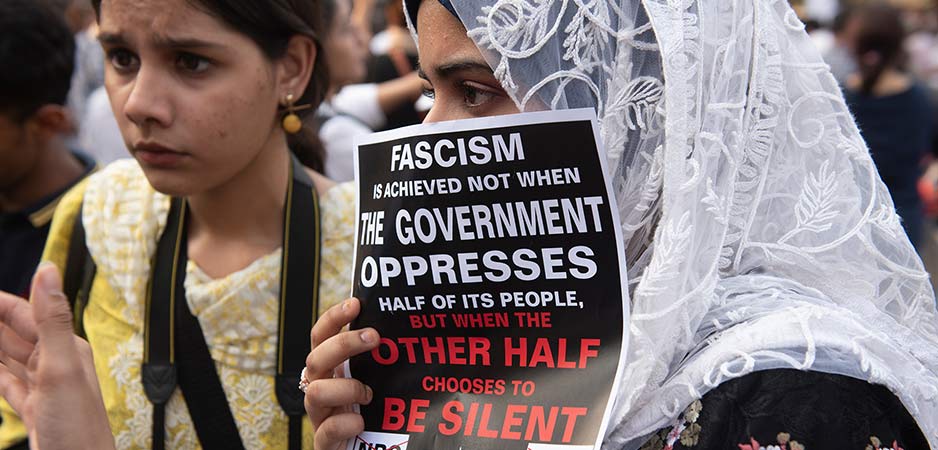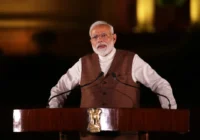Ever since the ruling Bharatiya Janata Party (BJP) enacted the Citizenship Amendment Act that discriminates specifically against Muslim asylum seekers, India’s Muslim minority has been protesting and agitating. It is reacting against what it perceives to be majoritarian tyranny that has been exacerbated by the rise of the “Saffron brigade.”
Muslim protests would not have carried much weight without the support of the enlightened sections of the majority Hindu community. Other minority communities have also supported the protests, amplifying the voice of India’s Muslims. In fact, the best Indian minds have followed their conscience and spoken out against the new citizenship law. They argue that it is a flagrant violation of the spirit of the Indian Constitution, which is based on inclusion, secularism, pluralism and democracy.
Time to Leave the Ghetto and Integrate
In keeping with the inclusive spirit of the constitution, Muslim leaders must now integrate and even assimilate into the Indian mainstream. Their leaders and opinion leaders must understand that they are an indivisible part of the Indian nation. So, opposing some of the symbols of this young nation such as Vande Mataram, the Sanskrit hymn to the motherland, is counterproductive. Similarly, invoking Islamic imagery in politics is equally unhelpful to India and their own interests.
Similarly, Indian Muslims must not get insulated into a ghetto mentality fomented by conventional mullahs. The ulema have created all sorts of cultural and psychological hurdles for Indian Muslims to get a modern education. This means that they are unable to claim their legitimate rights as citizens of India, which include schools, hospitals, roads and basic services. This ghetto mentality has been a key factor why Indian Muslims have been left behind economically and educationally.
It is indubitable that sections of Hindu society have deep contempt for Muslims, which has been nurtured for a very long time. Furthermore, the Indian state has failed to adopt policies that could help poor Muslims break out of the stranglehold of poverty and illiteracy. Both prejudice and policy have exacerbated the overall bad situation Indian Muslims find themselves in.
Currently, different communities in India are governed by different laws determining marriage, divorce, inheritance, etc. These laws are based on religion. The BJP has long been planning to replace different laws governing personal matters of citizens and draft a uniform civil code. The Indian Supreme Court has repeatedly called for such a code.
In 1985, the Supreme Court delivered a judgment in a famous case that granted a nominal alimony to an aggrieved divorced Muslim woman. The poor 62-year-old mother of five had been cast aside by her husband and had no means of supporting herself. Now known as the Shah Bano case, this judgment has become a landmark in Indian history. Conservative mullahs opposed this ruling, and Rajiv Gandhi, then the prime minister, overturned this enlightened judgment through a constitutional amendment to gain the Muslim vote.
This opportunistic move by the Gandhi government caused great harm. It allowed the BJP to make the charge of minority appeasement and pseudo-secularism. The charge stuck because there was an element of truth in it. The winners of the dubious constitutional amendment were the conservative mullahs and the communal BJP. Muslim women and the Muslim community ended up as the big losers in the long term.
Therefore, if the BJP introduces a bill for a uniform civil code, I urge Indian Muslims not to oppose it. Such a code would be in keeping with the spirit of the Indian Constitution, which is still the best bet and hope for all Indian citizens.
Humanism and Pluralism
Indian Muslims must realize that there is no magic solution to their backwardness. They must make an all-out effort to adopt a modern worldview even as they remain steadfast to their spiritual beliefs. Islam as an identity marker is fine, but it should harmonize with an Indian identity.
The two-nation theory of Mohammad Ali Jinnah did great harm to the one-third of the Muslims of British India who did not leave for Pakistan and remained behind in India. That past cannot be undone, but the present is here and now.
The time has come for Indian Muslims to adapt to present realities. They must adopt a positive attitude toward other communities. India is unique in being a fascinating mosaic of ethnicities and languages. Historically, Hinduism has enabled this mosaic, which has one great quality: It is willing to leave you alone if you learn to mind your own business.
Hindutva is a political ideology like Zionism and Islamism. It is based on the idea that people of one religion form a nation. The counterweight to this religion-based ideology is humanism. We must accept pluralism, fairness and justice as the basis for living together in dignity and security as the basis of any nation.
The views expressed in this article are the author’s own and do not necessarily reflect Fair Observer’s editorial policy.
Support Fair Observer
We rely on your support for our independence, diversity and quality.
For more than 10 years, Fair Observer has been free, fair and independent. No billionaire owns us, no advertisers control us. We are a reader-supported nonprofit. Unlike many other publications, we keep our content free for readers regardless of where they live or whether they can afford to pay. We have no paywalls and no ads.
In the post-truth era of fake news, echo chambers and filter bubbles, we publish a plurality of perspectives from around the world. Anyone can publish with us, but everyone goes through a rigorous editorial process. So, you get fact-checked, well-reasoned content instead of noise.
We publish 2,500+ voices from 90+ countries. We also conduct education and training programs
on subjects ranging from digital media and journalism to writing and critical thinking. This
doesn’t come cheap. Servers, editors, trainers and web developers cost
money.
Please consider supporting us on a regular basis as a recurring donor or a
sustaining member.
Will you support FO’s journalism?
We rely on your support for our independence, diversity and quality.






